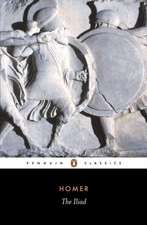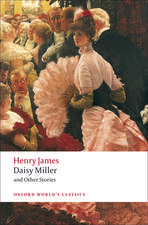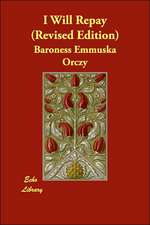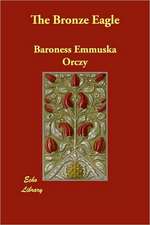The Scarlet Pimpernel: Pimpernel Novels
Autor Baroness Orczy, Emmuska Ralph Coshamen Limba Engleză CD-Audio – 30 apr 2013
| Toate formatele și edițiile | Preț | Express |
|---|---|---|
| Paperback (3) | 32.12 lei 3-5 săpt. | +5.97 lei 6-12 zile |
| Bantam Books – 31 ian 2002 | 32.12 lei 3-5 săpt. | +5.97 lei 6-12 zile |
| Dover Publications – 31 iul 2002 | 55.48 lei 3-5 săpt. | |
| Simon & Brown – 31 dec 2010 | 149.94 lei 39-44 zile | |
| CD-Audio (1) | 138.45 lei 3-5 săpt. | |
| BLACKSTONE AUDIO BOOKS – 30 apr 2013 | 138.45 lei 3-5 săpt. |
Preț: 138.45 lei
Nou
26.49€ • 28.33$ • 22.09£
Disponibil
Livrare economică 27 martie-10 aprilie
Specificații
ISBN-10: 1470887045
Dimensiuni: 132 x 145 x 20 mm
Greutate: 0.18 kg
Editura: BLACKSTONE AUDIO BOOKS
Seria Pimpernel Novels
Notă biografică
Baroness Emmuska Orczy artist, playwright, and author, was born in Tarnaörs, Hungary, in 1865. Although all her manuscripts were written in English, she did not learn the language until she and her parents, Baron Felix and Countess Emma Orczy, moved to London when she was fifteen. Schooled as a painter, she married fellow art student John Montagu Barstow in 1894. Although some of her paintings were accepted by the Royal Academy in London, the influence of the works of Dickens and Bret Harte, as well as newly popular light fiction from America, encouraged her to write. A prolific author, the Baroness penned dozens of romantic novels, detective stories, and plays, but is best remembered for The Scarlet Pimpernel. Based on an idea that came to her on a London underground platform, the story took just five weeks to write and become a huge success in print, on stage, and in film. Her other works include The Man in Grey, Skin O' My Tooth, The Laughing Cavalier, and Eldorado, a sequel to The Scarlet Pimpernel. Baroness Orczy died in London in 1947.
Extras
Paris: September 1792
A surging, seething, murmuring crowd, of beings that are human only in name, for to the eye and ear they seem naught but savage creatures, animated by vile passions and by the lust of vengeance and of hate. The hour, some little time before sunset, and the place, the West Barricade, at the very spot where, a decade later, a proud tyrant raised an undying monument to the nation’s glory and his own vanity.
During the greater part of the day the guillotine had been kept busy at its ghastly work: all that France had boasted of in the past centuries, of ancient names, and blue blood, had paid toll to her desire for liberty and for fraternity. The carnage had only ceased at this late hour of the day because there were other more interesting sights for the people to witness, a little while before the final closing of the barricades for the night.
And so the crowd rushed away from the Place de la Grève and made for the various barricades in order to watch this interesting and amusing sight.
It was to be seen every day, for those aristos were such fools! They were traitors to the people of course, all of them, men, women, and children, who happened to be descendants of the great men who since the Crusades had made the glory of France: her old noblesse. Their ancestors had oppressed the people, had crushed them under the scarlet heels of their dainty buckled shoes, and now the people had become the rulers of France and crushed their former masters—not beneath their heel, for they went shoeless mostly in these days—but beneath a more effectual weight, the knife of the guillotine.
And daily, hourly, the hideous instrument of torture claimed its many victims—old men, young women, tiny children, even until the day when it would finally demand the head of a King and of a beautiful young Queen.
But this was as it should be: were not the people now the rulers of France? Every aristocrat was a traitor, as his ancestors had been before him: for two hundred years now the people had sweated, and toiled, and starved, to keep a lustful court in lavish extravagance; now the descendants of those who had helped to make those courts brilliant had to hide for their lives—to fly, if they wished to avoid the tardy vengeance of the people.
And they did try to hide, and tried to fly: that was just the fun of the whole thing. Every afternoon before the gates closed and the market carts went out in procession by the various barricades, some fool of an aristo endeavoured to evade the clutches of the Committee of Public Safety. In various disguises, under various pretexts, they tried to slip through the barriers which were so well guarded by citizen soldiers of the Republic. Men in women’s clothes, women in male attire, children disguised in beggars’ rags: there were some of all sorts: ci-devant counts, marquises, even dukes, who wanted to fly from France, reach England or some other equally accursed country, and there try to rouse foreign feeling against the glorious Revolution, or to raise an army in order to liberate the wretched prisoners in the Temple, who had once called themselves sovereigns of France.
But they were nearly always caught at the barricades. Sergeant Bibot especially at the West Gate had a wonderful nose for scenting an aristo in the most perfect disguise. Then, of course, the fun began. Bibot would look at his prey as a cat looks upon the mouse, play with him, sometimes for quite a quarter of an hour, pretend to be hoodwinked by the disguise, by the wigs and other bits of theatrical make-up which hid the identity of a ci-devant noble marquise or count.
Oh! Bibot had a keen sense of humour, and it was well worth hanging round that West Barricade, in order to see him catch an aristo in the very act of trying to flee from the vengeance of the people.
Sometimes Bibot would let his prey actually out by the gates, allowing him to think for the space of two minutes at least that he really had escaped out of Paris, and might even manage to reach the coast of England in safety: but Bibot would let the unfortunate wretch walk about ten mètres towards the open country, then he would send two men after him and bring him back, stripped of his disguise.
Oh! that was extremely funny, for as often as not the fugitive would prove to be a woman, some proud marchioness, who looked terribly comical when she found herself in Bibot’s clutches after all, and knew that a summary trial would await her the next day and after that, the fond embrace of Madame la Guillotine.
No wonder that on this fine afternoon in September the crowd round Bibot’s gate was eager and excited. The lust of blood grows with its satisfaction, there is no satiety: the crowd had seen a hundred noble heads fall beneath the guillotine to-day, it wanted to make sure that it would see another hundred fall on the morrow.
Bibot was sitting on an overturned and empty cask close by the gate of the barricade; a small detachment of citoyen soldiers was under his command. The work had been very hot lately. Those cursed aristos were becoming terrified and tried their hardest to slip out of Paris: men, women and children, whose ancestors, even in remote ages, had served those traitorous Bourbons, were all traitors themselves and right food for the guillotine. Every day Bibot had had the satisfaction of unmasking some fugitive royalists and sending them back to be tried by the Committee of Public Safety, presided over by that good patriot, Citoyen Foucquier-Tinville.
Robespierre and Danton both had commended Bibot for his zeal, and Bibot was proud of the fact that he on his own initiative had sent at least fifty aristos to the guillotine.
But to-day all the sergeants in command at the various barricades had had special orders. Recently a very great number of aristos had succeeded in escaping out of France and in reaching England safely. There were curious rumours about these escapes; they had become very frequent and singularly daring; the people’s minds were becoming strangely excited about it all. Sergeant Grospierre had been sent to the guillotine for allowing a whole family of aristos to slip out of the North Gate under his very nose.
It was asserted that these escapes were organised by a band of Englishmen, whose daring seemed to be unparalleled, and who, from sheer desire to meddle in what did not concern them, spent their spare time in snatching away lawful victims destined for Madame la Guillotine. These rumours soon grew in extravagance; there was no doubt that this band of meddlesome Englishmen did exist; moreover, they seemed to be under the leadership of a man whose pluck and audacity were almost fabulous. Strange stories were afloat of how he and those aristos whom he rescued became suddenly invisible as they reached the barricades and escaped out of the gates by sheer supernatural agency.
No one had seen these mysterious Englishmen; as for their leader, he was never spoken of, save with a superstitious shudder. Citoyen Foucquier-Tinville would in the course of the day receive a scrap of paper from some mysterious source; sometimes he would find it in the pocket of his coat, at others it would be handed to him by someone in the crowd, whilst he was on his way to the sitting of the Committee of Public Safety. The paper always contained a brief notice that the band of meddlesome Englishmen were at work, and it was always signed with a device drawn in red—a little star-shaped flower, which we in England call the Scarlet Pimpernel. Within a few hours of the receipt of this impudent notice, the citoyens of the Committee of Public Safety would hear that so many royalists and aristocrats had succeeded in reaching the coast, and were on their way to England and safety.
The guards at the gates had been doubled, the sergeants in command had been threatened with death, whilst liberal rewards were offered for the capture of these daring and impudent Englishmen. There was a sum of five thousand francs promised to the man who laid hands on the mysterious and elusive Scarlet Pimpernel.
Everyone felt that Bibot would be that man, and Bibot allowed that belief to take firm root in everybody’s mind; and so, day after day, people came to watch him at the West Gate, so as to be present when he laid hands on any fugitive aristo who perhaps might be accompanied by that mysterious Englishman.
“Bah!” he said to his trusted corporal, “Citoyen Grospierre was a fool! Had it been me now, at that North Gate last week . . .”
Citoyen Bibot spat on the ground to express his contempt for his comrade’s stupidity.
“How did it happen, citoyen?” asked the corporal.
“Grospierre was at the gate, keeping good watch,” began Bibot, pompously, as the crowd closed in round him, listening eagerly to his narrative. “We’ve all heard of this meddlesome Englishman, this accursed Scarlet Pimpernel. He won’t get through my gate, morbleu! unless he be the devil himself. But Grospierre was a fool. The market carts were going through the gates; there was one laden with casks, and driven by an old man, with a boy beside him. Grospierre was a bit drunk, but he thought himself very clever; he looked into the casks—most of them, at least—and saw they were empty, and let the cart go through.”
A murmur of wrath and contempt went round the group of ill-clad wretches, who crowded round Citoyen Bibot.
“Half an hour later,” continued the sergeant, “up comes a captain of the guard with a squad of some dozen soldiers with him. ‘Has a cart gone through?’ he asks of Grospierre, breathlessly. ‘Yes,’ says Grospierre, ‘not half an hour ago.’ ‘And you have let them escape,’ shouts the captain furiously. ‘You’ll go to the guillotine for this, citoyen sergeant! that cart held concealed the ci-devant Duc de Chalis and all his family!’ ‘What!’ thunders Grospierre, aghast. ‘Aye! and the driver was none other than that cursed Englishman, the Scarlet Pimpernel.’ ”
A howl of execration greeted this tale. Citoyen Grospierre had paid for his blunder on the guillotine, but what a fool! oh! what a fool!
Bibot was laughing so much at his own tale that it was some time before he could continue.
“ ‘After them, my men,’ shouts the captain,” he said, after a while, “ ‘remember the reward; after them, they cannot have gone far!’ And with that he rushes through the gate, followed by his dozen soldiers.”
“But it was too late!” shouted the crowd, excitedly.
“They never got them!”
“Curse that Grospierre for his folly!”
“He deserved his fate!”
“Fancy not examining those casks properly!”
But these sallies seemed to amuse Citoyen Bibot exceedingly; he laughed until his sides ached, and the tears streamed down his cheeks.
“Nay, nay!” he said at last, “those aristos weren’t in the cart; the driver was not the Scarlet Pimpernel!”
“What?”
“No! The captain of the guard was that damned Englishman in disguise, and everyone of his soldiers aristos!”
The crowd this time said nothing: the story certainly savoured of the supernatural, and though the Republic had abolished God, it had not quite succeeded in killing the fear of the supernatural in the hearts of the people. Truly that Englishman must be the devil himself.
The sun was sinking low down in the west. Bibot prepared himself to close the gates.
“En avant the carts,” he said.
Some dozen covered carts were drawn up in a row, ready to leave town, in order to fetch the produce from the country close by, for market the next morning. They were mostly well known to Bibot, as they went through his gate twice every day on their way to and from the town. He spoke to one or two of their drivers—mostly women—and was at great pains to examine the inside of the carts.
“You never know,” he would say, “and I’m not going to be caught like that fool Grospierre.”
From the Trade Paperback edition.
Recenzii
From the Trade Paperback edition.
Descriere
It is 1792 and France is in the grip of a seething, bloody revolution. Mobs roam the Paris streets hunting down royalists, barricades block any chance of escape, and every day hundreds die under the blade of Madame la Guillotine. But in the hearts of the condemned nobility there remains one last vestige of hope: rescue by the elusive Scarlet Pimpernel. Renowned for both his unparalleled bravery and his clever disguises, the Pimpernel’s identity remains as much a mystery to his sworn enemy, the ruthless French agent Chauvelin, as to his devoted admirer, the beautiful Lady Marguerite Blakeney.
First published in 1905, The Scarlet Pimpernel is an irresistible novel of love, gallantry, and swashbuckling adventure.























